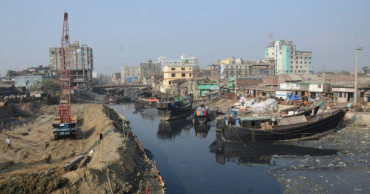sewerage
Most sewerage lines of city houses illegally connected to surface drains
Most house owners in Dhaka have connected their sewage discharge pipes to the surface drains of the City Corporation instead of sewage management networks.
This results in severe pollution to the lakes in and around the capital.
Campaigns will be conducted in every ward in Dhaka North City Corporation to block those illegal sewage lines, the city corporation mayor Atiqul Islam told UNB.
Sewage networks should not be connected to the city corporation's surface drains in any way. The house owners should immediately disconnect those illegal lines. If not, it will be permanently disconnected by the city corporation authorities, the Mayor alerted the house owners.
Also Read: Sewerage: Dhaka, Tokyo launch partnership for improved services
“Campaign will continue in every ward of the city corporation in phases and no compromise will be made in this regard,” Atiq said.
To make the campaign successful, Mayor Atiqul put emphasis on creating awareness among the house owners. Besides, ward councilors and city corporation officials will perform their respective duties to resolve the problem, added the Mayor.
“We repeatedly asked the house owners not to connect their sewage lines to the surface drains but they did not pay any importance. We have even given public notification to be aware in this regard but we did not get any positive response from them. So we have been compelled to conduct a drive,” he said. “Strict action will be taken against those who are involved in these illegal activities."
“We had a meeting with the representatives of Baridhara and Gulshan Society over the issue but no one is paying attention even after saying it again and again”, he said.
Read More: WASA key reason behind pollution of Dhaka’s rivers, NRCC chairman says
Mayor Atiqul Islam said, "Illegal sewage connections in elite areas is a matter of great regret. The wastes of these houses are supposed to flow through separate WASA lines. Where there are no water lines, ETP plants should be installed by the house owners to manage the wastes."
He said, “We have conducted a ground survey in Gulshan, Banani, Baridhara and Niketan areas of the city and the findings are appalling. According to the survey, about 85 percent of the houses have sewage lines in surface drains. It is verily alarming in such VIP areas. It is polluting the canal and lake water. To save the city, the authorities were forced to plug these connections.”
At least 3,830 houses were surveyed in these four areas. Of these houses, 3,265 houses discharged sewage directly into surface drains and lakes. Only 41 houses have proper sewerage connection and 524 houses have partial sewage management. As a result, the natural beauty of the lake is being destroyed and mosquito infestation is increasing.
Out of 550 houses in Baridhara, which is known as the most elite area of the country, 342 houses have connected their sewage lines to surface drains. The survey report found, only 5 houses in Baridhara have not been connected to surface drains out of eight level criteria laid down while 203 houses met few of the conditions. On the other hand, 342 houses did not fulfill a single condition, whose house sewage line is connected to the surface drain.
Read More: Sylhet to get its own WASA: LGRD Minister
As part of the drive, the city corporation placed banana trees in the drains to stop the flow of waste coming from the sewerage lines of four houses in the Baridhara-11 area.
According to the DNCC, the Sanitation Compliance Committee comprising the chief waste management officer of DNCC in Gulshan, Banani, Baridhara and Niketan areas, former professor of BUET Md Mujibur Rahman, representatives of Dhaka Wasa, International Training Network Centre (ITN-BUET), housing society and UNICEF supervised the survey work.
Dhaka North City Corporation (DNCC) started an operation this month to stop the connection of sewage to surface drains, canals or lakes. As part of the campaign, DNCC Mayor Atiqul Islam took part in the campaign and stopped the sewage connection of two houses from the surface drain on Road No. 104 and 112 of Gulshan-2.
Additionally, the lake's high water contamination makes it impossible to cultivate the fish. Therefore, natural repellents to kill mosquitoes are not possible due to the inability to farm fish, Mayor Atiq said.
Read More: Monster made of plastic waste at Cox’s Bazar to spread awareness
"As we do not have any scheduled campaign at this moment, we are creating awareness among the house owners, especially the owners of newly constructed buildings over the issue", Md Mizanur Rahman, CEO of Dhaka South City Corporation, told UNB.
"Besides, we are giving time to disconnect all the old houses which are already connected to the sewerage line of the City Corporation and transfer them to WASA drainage," he added.
3 years ago
WASA key reason behind pollution of Dhaka’s rivers, NRCC chairman says
Although there are directives from the country’s highest court to save rivers, authorities concerned have failed miserably to stop pollution and encroachment. Thus, rivers around Dhaka city are still being polluted.
In an interview with UNB, Dr Manjur Ahmed, chairman of National River Conservation Commission (NRCC), put a major share of the blame on Dhaka WASA.
Dhaka WASA’s failure to construct enough sewerage lines has created a disastrous situation. Factories in and around Dhaka dispose of waste into the rivers surrounding the city. Combination of household and industrial wastes has turned rivers like Buriganga and Shitalakhya “ecologically dead”.
Read:Buriganga Pollution: Contempt rule issued against Wasa MD
“All the human waste produced in Dhaka city goes into the four rivers surrounding it. This happens due to Dhaka WASA’s failure to manage the waste. Excrement and rainwater go to the rivers through the same pipe. It was WASA’s duty to set up separate pipes for proper flow of the wastes. They didn’t do so, and as a result rivers are being polluted fast,” said Manjur.
The NRCC chairman added that although much of the grabbed lands by the rivers have been recovered, pollution couldn’t be stopped as those responsible were not brought under the law.
“At least four crore people live in and around Dhaka city but there isn’t a single river or waterbody where people can bathe. Population density, unmanageable development, withdrawal of water in the upstream and climate change are affecting the country’s rivers. As an organization working to conserve rivers, NRCC is acutely aware of these problems,” said Manjur.
Read:Dhaka rivers get polluted, WASA moves to supply water from Meghna
About NRCC, Manjur said that the role of his organization is to identify the problems and provide recommendations to the concerned authorities.
“NRCC is a relatively new organization. Some recommendations made by us have already been implemented and others are pending with the authorities. So far, we’ve identified 57,000 illegal encroachers and evicted 14,000 of them through the help of the district administrations and Bangladesh Inland Water Transport Authority (BIWTA),” said Manjur.
On the demarcation of river boundaries, the NRCC chairman said that it’s a tough task.
Read Tajul briefs JS on Wasa, city corporations' projects to serve capital
“The boundaries of Buriganga, Turag and Balu rivers have already been demarcated. I hope that the rest of the rivers will also be demarcated gradually,” said Manjur.
On the master plan that NRCC was preparing, Manjur said that it is yet to be completed.
“The process of preparing the master plan was interrupted due to the Covid-19 pandemic. I hope that we’ll be able to complete the master plan within a short time,” the NRCC chairman said.
Read LGRD Minister directs WASA to fix water price in capital rationally
During the interview, he informed UNB that his organization aims to put an end to pollution of the rivers surrounding Dhaka within March 17, 2023, which is the birth anniversary of Father of the Nation Bangabandhu Sheikh Mujibur Rahman.
“We’ll provide directives to all the government and private establishments in Dhaka and adjacent areas to stop polluting the rivers surrounding the city very soon. Legal steps will be taken if anyone breaches the rules and fails to comply with the directives,” Manjur said.
3 years ago
Sylhet to get its own WASA: LGRD Minister
Sylhet WASA will be established soon to solve the problem of water and sewerage in Sylhet metropolis, said Local Government and Rural Development (LGRD) Minister Md Tajul Islam.
The minister said, "There is a need to build environmentally friendly, sustainable and people-oriented drinking water supply and sanitary drainage systems for the people of the metropolis."
Sylhet is one of the most important cities in the country. Due to population and urbanisation, the dwellers need to be provided with much needed civic amenities, said the minister in a meeting on setting up of 'Water Supply and Sewerage Authority' (Sylhet WASA) in Sylhet City Corporation area as per 'Water Supply and Sewerage Authority 1996' organized virtually on Sunday.
Read:BGMEA urges LGRD Ministry to repair roads in industrial areas
Tajul Islam informed that necessary instructions have been given to the Ministries, Departments, Offices and Agencies concerned to take immediate action for issuing Gazette Notification, Organogram, Formulation of Employment Rules and other activities as initial steps for formation of Water Supply and Sewerage Authority (Sylhet WASA) in Sylhet metropolis.
The Minister also expressed hope that it will be possible to establish Sylhet WASA very soon.
Stating his ministry is working tirelessly to protect the overall environment by adopting and implementing realistic sustainable projects for the development of drinking water supply management in urban and rural areas, he said the government has placed more emphasis on surface water use by reducing dependence on groundwater resources.
To this end, various steps have been taken to increase the use of river water in urban as well as rural areas, digging ponds, and using surface water through rainwater harvesting.
In this regard, he further said, in accordance with SDG, it has been assured to use 70% surface water by 2030. And Bangladesh will achieve the target before this time.
The LGRD minister said there are water problems in many countries of the world. "Being a riverine country, we have fewer problems with water than many other countries. Even after this capacity, we are working to ensure drinking water and a healthy sewerage system in remote areas of the country."
Mentioning that the country is moving forward under the leadership of Prime Minister Sheikh Hasina, he said that unprecedented success has been achieved in the development of all sectors due to collective work not only in water but also in other sectors.
Read:Recovered city canals will end waterlogging and add beauty: LGRD Minister
Meanwhile, taking part in the meeting, Foreign Minister Dr AK Abdul Momen said the population of Sylhet has increased many times over. So it became urgent to establish a WASA there.
He thanked the LGRD Minister for taking the initiative to establish Sylhet WASA from this realization and assured all possible assistance for its speedy implementation.
The meeting was attended by Senior Secretary of LGRD ministry Helal Uddin Ahmed, Mayor of Sylhet City Corporation Ariful Haque Choudhury and senior officials of the ministry concerned.
4 years ago




